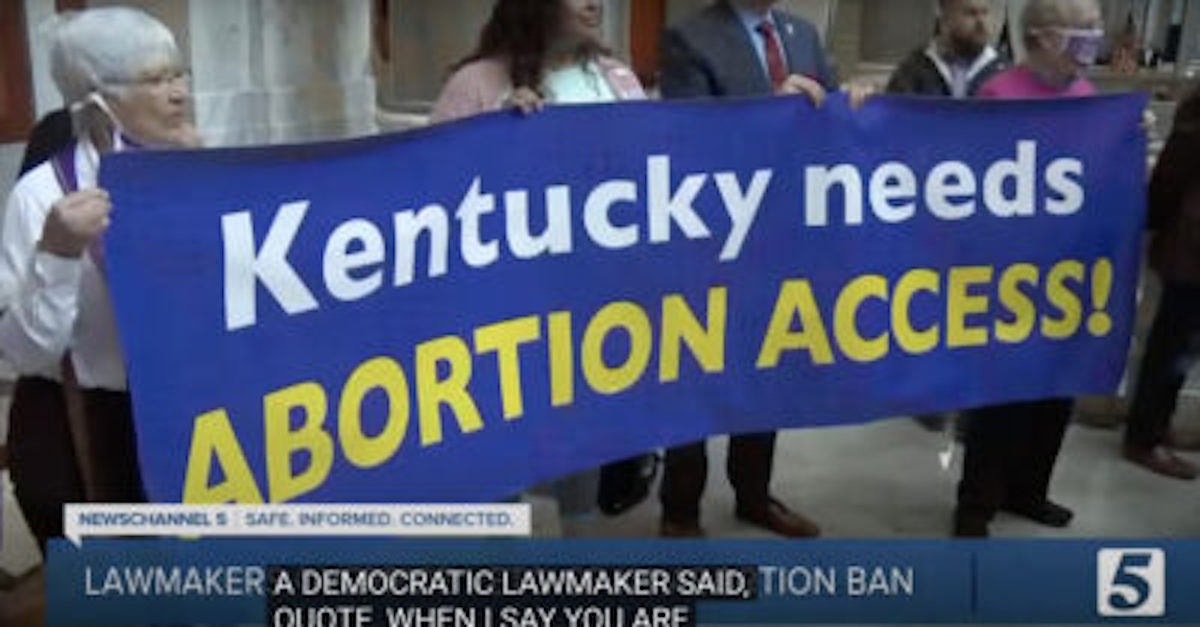
Individuals hold a banner at the Kentucky statehouse after the state legislature overrides the veto of H.B. 3 (via screengrab).
An all-male panel of federal appeals court judges ruled against an ordinance creating a 10-foot “buffer zone” at Kentucky’s only abortion clinic Wednesday, reasoning that an anti-abortion group was simply offering “compassionate, if sometimes unwelcome, speech to women entering abortion clinics.”
Anti-abortion activist group Sisters for Life focuses “much or all” of its activities on doing what members call “sidewalk counseling” — that is, hoisting unsolicited conversations upon women trying to enter EMW Women’s Surgical Center in Louisville for the purpose of convincing them to forego abortions. EMW is Kentucky’s only abortion clinic.
Louisville-Jefferson County passed an ordinance in May 2021 that prohibited anyone from coming within 10 feet of the entrance or exit to the facility during its business hours. The regulation, which became known as the “buffer zone law,” said violators would get a simple warning for their first violation, but would be fined $150 to $500 for subsequent violations.
Sisters for Life sued and claimed the ordinance violated its First and Fourteenth Amendment rights. U.S. District Judge Rebecca Grady Jennings, a Donald Trump appointee, refused to grant the group a preliminary injunction on the basis that the group failed to show that its claim was likely to succeed on the merits.
The advocacy group appealed to the U.S. Court of Appeals for the 6th Circuit and convinced a three-judge panel that Jennings had abused her discretion in the case below.
The panel consisted of U.S. Circuit Judges Jeffrey Sutton and Richard Allen Griffin, both George W. Bush appointees, and John Nalbandian, Trump appointee.
Sutton penned the 12-page opinion for the panel, which ruled in favor of the Sisters for Life. He reasoned that “streets and sidewalks ‘occupy a special position in terms of First Amendment protection,'” and that the buffer zone ordinance would likely not survive strict scrutiny. The panel warned that the ordinance might appear neutral on its face, but then become enforced only against anti-abortion speakers while allowing pro-choice speakers to express their point of view.
Sutton also took issue with the statute’s applicability to “all medical facilities” in Louisville. This broad application, said Sutton, constituted a burden on more speech than is necessary to protect women headed into EMW.
Sutton suggested that the county use EMW’s video surveillance footage to help law enforcement track down harassing protesters, or go to court and get restraining orders against known harassers, rather than ban everyone from speaking near the clinic’s entrance. Periodic police patrolling might also help any problems, said the panel.
The panel was clear that it did not consider Sisters for Life a group of potential harassers. Sutton wrote in the opinion:
Keep in mind, moreover, that the goal of the plaintiffs is not to harass or protest, whether loudly or violently. The point of their speech is to offer a compassionate ear. To this day, it remains unclear why the County has sought to suppress their speech along with those types of protests that are far more likely to hinder access to a clinic and are sometimes designed to do just that.
Sutton also grounded the decision in something of a lament for the abortions Sisters for Life might have prevented if its members’ speech had not been stymied.
“One of today’s plaintiffs says she persuaded ‘three to six’ women per month to forego abortion before passage of the buffer-zone law, but ‘none’ afterwards,” Sutton wrote. “Another, who says he helped to prevent between fifty and sixty abortions per year prior to the ordinance, says the ordinance has ‘practically eliminated’ effective sidewalk counseling.”
The panel returned the case back to Jennings with instructions that she issue an injunction blocking the law while the litigation against it proceeds.